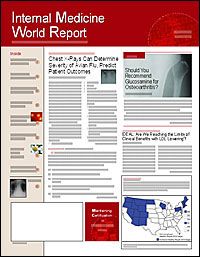Comparing Onset and Sustained Efficacy of 2 Common Antidepressants
WAIKOLOA, Hawaii?A similar onset of action has been demonstrated between 2 major antidepressants, duloxetine (Cym?bal?ta) and escitalopram (Lexapro), but ?du?loxetine provided significantly ?better im?provements compared with placebo after 2 months of treatment, according to data pre??sented at the American College of ?Neu???ro?????psycho?pharma?cology annual meeting.
"The most important finding was also the primary objective of the study?to determine if duloxetine starts working as quickly in patients with major depressive disorder as escitalopram, which is known to be a treatment with a quick onset of action," investigator Madelaine M. Woh?lreich, MD, of Eli Lilly and Company, ?In?dian?apolis, Ill, told IMWR. "The study sh?ows that, for duloxetine, onset of ?antidepressant activity is at least as fast as escitalopram."
Included were 684 adult patients with major depressive disorder who were randomized to duloxetine 60 mg once daily (n = 273), escitalopram 10 mg once daily (n = 274), or placebo (n = 137) for 8 weeks.
The primary hypothesis of the study was that the proportion of patients receiving duloxetine who achieved efficacy onset at week 2 would be at least as great as those receiving escitalopram. Onset of action was defined as a >=20% decrease from baseline in the Maier subscale of the Hamilton Anxiety Depression-17 (HAMD-17).
Secondary measures included the Hamilton Anxiety Rating, Clinical Global Impression of Severity (CGI-S), and the self-reported Patient Global Impression of Improvement (PGI-I) scales.
The Table shows the major results. Only duloxetine showed a significant difference from placebo (P = .021) in total HAMD-17 score improvement. Both duloxetine and escitalopram showed statistically significant differences from placebo in CGI-S and PGI-I scales. Discon?tin?ua?tion rates were similar in all 3 groups.
"Secondary analyses found that probabilities of response for placebo, duloxetine, and escitalopram were 36.9%, 48.7%, and 45.3%, and for remission 27.7%, 40.1%, and 33.0%, respectively, with no statistically significant differences between groups," the investigators reported.
"The implication of this study for prescribing doctors is that they don't need to trade maximum efficacy for earlier onset," Dr Wohlreich said. "It has already been established in previous studies that duloxetine works well in relieving the emotional and physical symptoms of depression. This study shows us that duloxetine works at least as fast as a known fast-acting drug, which is good news for doctors and patients."
